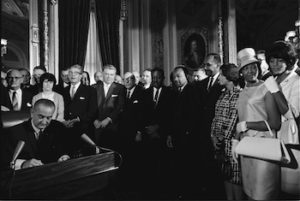
*The American Voting Rights Act of 1965 was enacted on this date. It was one of the most sweeping reforms in American history.
Pushed for change through the American Civil Rights movement in the 1950s and '60s were century-old practices that prevented blacks from exercising their legal right to vote. This law provided for the automatic suspension of literacy tests and other voter qualification devices because they were applied in a discriminatory way; gave federal voting examiners the authority to register voters in areas not meeting certain voter participation requirements; authorized the U. S. attorney general to investigate the validity of state poll taxes; required federal review to prevent racial discrimination by new state voting laws; and interfered with voting rights conferred by the law a criminal offense.
In addition to this law was the 24th Amendment to the U. S. Constitution, ratified in 1964, prohibiting poll taxes as a qualification for voting in federal elections. In 1970, the Voting Rights Act was extended, and the voting age was lowered to 18. The Supreme Court later upheld the vote for 18-year-olds in federal elections but ruled that Congress had unconstitutionally lowered the voting age to 18 in state and local elections. This problem was solved by the 26th Amendment, ratified in 1971, providing that citizens 18 or older could not be denied the franchise “on account of age.”

The Voting Rights Act was amended twice, in 1975 and 1982. Among the most important provisions of the later amendments were the addition of bilingual requirements in some counties, a permanent nationwide ban on the use of literacy tests as a voting requirement, and a law allowing voters nationwide who are illiterate, blind, or disabled to be assisted in the voting booth by a person of their own choice. These amendments also made it easier for minorities to use the courts to attack discriminatory election methods.
Other laws have been passed that protect the franchise of certain groups; for example, U. S. citizens residing abroad were granted the right to vote in federal elections by absentee ballot in 1975, and voting accessibility for the elderly was guaranteed in 1984.
The Voting Rights Act has been under constant attack in the 21st century. The 2006 extension of Section 5 was challenged in a lawsuit, Northwest Austin Municipal Utility District No. 1 v. Holder, which was argued before the Supreme Court on April 30, 2009. A municipal water district in Texas, which elects members to a water board, brought the lawsuit. The district has not registered voters or been accused of discrimination. However, it wished to move the voting location from a private home to a public school; the preclearance procedure required it to seek approval from the Justice Department because Texas is a covered jurisdiction under Section 5. The Court did not declare Section 5 preclearance unconstitutional; instead, it interpreted the law to allow any political subdivision covered by Section 5, including those not registering voters, to obtain an exemption from preclearance if it meets the bailout requirements.
On November 9, 2012, the Supreme Court granted certiorari in the case of Shelby County v. Holder originating from Shelby County, Alabama, limited to the question of "whether Congress' decision in 2006 to reauthorize Section 5 of the Voting Rights Act under the pre-existing coverage formula of Section 4(b) of the Voting Rights Act exceeded its authority under the Fourteenth and Fifteenth Amendments, thus violating the Tenth Amendment and Article IV of the United States Constitution".
On June 25, 2013, the Supreme Court struck down Section 4(b) of the Act as unconstitutional because the coverage formula is "based on 40-year-old facts having no logical relationship to the present day" and thus unresponsive to current conditions. The Court did not strike down Section 5, but without Section 4(b), no jurisdiction will be subject to Section 5 pre-clearance unless Congress enacts a new coverage formula. In the face of voter suppression, the 2016, 2018, 2020, and 2024 American national elections reflect the strength of the 1965 Voting Rights Act.